Georges de Nantes.
The Mystical Doctor of the Catholic Faith.
6. THE LIBERATED SEMINARY
AFTER having witnessed the horrors of the “ Liberation ” during his first holidays in the summer of 1944, “ finally the date for returning to the seminary arrived. I was tremendously happy. The trip was long, through a land marked by battles, demolished bridges, bombarded stations; we crawled along. When I arrived at Issy-les-Moulineaux, matured by so many events seen, however, from a distance, the change struck me from the first moment. Truly another life was beginning. ” 1
Thus, “ Fr. Rabeau [his spiritual director] had the idea of gathering those under his direction in his office, which was quite contrary to the tradition of discretion with which the Sulpicians surrounded all that concerned the direction of conscience. His reason for doing so was to declare to us that now we were going to see appear in him a new man, the true one, that four years of occupation had prevented him from being, for he was unable to bear ‘ without vomiting ’ this government of traitors that was presided over in Vichy by a perfidious Marshal. Finally, everything was coming back to the way it was before. We would see him happy, smiling, and proud of always having believed in de Gaulle. Since all was going better, we would all be better ! My confreres, in this cramped space into which we were crammed, seemed to share his happiness and I was very careful not to say anything ! Dazed, heart pounding, numb, I wondered how I would still be able to open my soul to such a monstrous spiritual father. It was my turn, I thought, to suppress my desire to vomit ! ” 2
This was but the beginning : it was not only a question of being liberated from the occupiers, then from the Marshal, but of a “ revolution that would end by overthrowing everything. ” 3 This revolution demanded its victims.
“ The first Sunday, after lunch according to custom, the ‘ groups ’ from the various provinces met for the period of recreation. The group from Grenoble welcomed their new members and each of them was invited to introduce himself. The oldest one, a certain Peyrin, began his account after a slight hesitation. He was from La Mure, a secretary at the town hall, and his parish priest, Fr. de Jouffrey – ah ! my uncle ! – was at the origin of his vocation. They were both fervent supporters of the Marshal, without being disliked by the population for this, quite the contrary. The region, however, was swarming with members of the Resistance. At the Liberation, the parish priest was denounced to the bishopric, which appointed him archpriest of Voreppe in order for him to avoid the ‘ punishment ’ due to traitors. As for the speaker, he was condemned to death for ‘ collaboration with the Vichy regime ! ’ We listened, dumbfounded, to this man who had escaped death, while the shouts of the footballers and the laughter of the other groups sometimes drowned out his weak voice. He continued :
“ There were five of us. They made us dig our graves and had us stand with our backs to the hole in order for us to fall into it on the impact of the bullets. I was the last. When they aimed at me, I shouted, I do not know why : ‘ I am innocent ! ’ Then the head of the Resistance fighters – you know, he is not a bad guy ! – said to the others : ‘ Stop, that’s enough for today, ’ and to me : ‘ All right, you can go, but don’t show your face again ! ’
“ So, with Fr. de Jouffrey, we thought that it was a sign of Providence and that the moment had come for me to enter the seminary. ”
“ He was smiling in an amused way that belied the unbearable anguish of those eyes that had seen all that we were unable to imagine – the firing squad in line, the firing of the four deadly salvos, the fall of the bodies – and that had looked death in the face. We were petrified. Then the others related their twopenny-halfpenny stories, with no possible comparison with this frightening tragedy, ” that haunted Fr. Peyrin, who became the parish priest of St. Martin de Vienne, throughout his life.
“ Thus it was that from moment to moment, the true and the false, the resistance fighter in battle-dress and the unknown man condemned to death, the victim and the traitor, began this coexistence and this mixing, in the seminary as in town, in which the embarrassing witnesses of the Vichy regime gradually began to withdraw and finally disappear, as the Gaullists and resistance fighters took up all the room. Thereupon, this very simple and new-found thought occurred to me : that is what a revolution is. The past ceased to be, at least as it had been. Denied or silenced under duress, falsified and quickly forgotten, it is as though it had never existed. The new masters build the future with the lies and illusions of the moment. ” 4
THE INNERMOST RENT.
“ The day after I had proof of it. Fr. Enne had decided to finish his apologetics course that had been interrupted by our hasty departure in June. I paid for my joy of hearing him once again with an equal dose of bitterness. The last chapter dealt with martyrdom, the decisive proof of the truth of our religion, according to his dear Pascal : ‘ I only believe the stories for which the witnesses are ready to have their throats slit. ’ (Pensées, 595) He developed the argument in the brilliant way to which he had accustomed us, then suddenly he threw off his glasses and, with the distraught look of a prophet that he put on in great moments, he declared to us that he could no longer honestly uphold such a proof in favour of Christianity alone ! What did the throes of our martyrs prove? They believed in Heaven and, in their agony, were already contemplating the eternal happiness that was awaiting them. What were we in comparison with the 70,000 members of the Communist Party 5 who had been shot to death ? They had died gallantly, without weakness, without having handed over their comrades under the torture of the Gestapo, with a smile on their lips, for France and for the victory of the working class. They, who only believed in this life, had nonetheless sacrificed it. ‘ No, gentlemen, I can no longer, and I ask you to reflect on it, I can no longer accept the death of our martyrs as a proof of the truth of our Faith… or else… ’ His eyes dilated, became lost in the distance – ah ! what an accomplished actor ! – ‘ or else, we will have to take into account the martyrs of Communism and open ourselves to the truth that they hold, attested to by so many more sacrificed people than we have ! ’ ”
“ I listened, stunned ; I refused to write those impious words, that delirium while, quietly leaning over their notebooks, my confreres were writing, were trustingly accepting that also, like all the rest, from their superior and master. How was it that I did not explode ? I still wonder… I was only twenty years old and so many blows had undoubtedly prostrated me. The narration, however, does not give an exact account of the full reality. At the same time that they were dealt to me, the life of the seminary, very beautiful, happy, busy and pious seemed to continue as though nothing should ever change, which benumbed the sorrow, allayed the disquiet. ”
It was then, at the very moment when he “ needed to roar, ” that he met Fr. Vimal, of whose political convictions he was unaware, but who was already in his eyes the incomparable master. “ Taking advantage of an occasion when we were alone, he expressed in violent terms all that I myself was no longer able to contain : his fury, his indignation, his scorn. I had found a brother, albeit older, wiser and stronger than I ! Obliging me to secrecy, he convinced me that we ought to remain as we were, without changing our convictions, for the service of the Church and out of a quite normal fidelity to our vocation. He was not totally alone. Thus we were a few who supported one another, and our seminarian who had been condemned to death, in his own way, more than anyone else. It never became a clan, but a holy friendship. ” 6
“ In this seminary gone mad, ” Providence kept for him his “ incomparable friend, ” whose teaching itself held the subversion in check !
The “ Liberation ” would even extend to philosophy. We saw this same Fr. Enne join Thomas Aquinas and Pétain, the regime of Vichy and the Middle Ages, scholastics and collaboration in an equal reprobation. What trust could be placed in masters who were nevertheless cherished and respected ? Advised by Fr. Vimal, the seminarian Georges de Nantes, a reactionary by tradition, continued to open his prodigiously receptive intelligence and his eager heart to the lessons of modern science, but the instinct of the Catholic truth kept him far from the depths of unbelief into which an entire generation was rushing as though ineluctably.
Science, yes ! Let it, however, serve for the better savouring of the Faith ! This second year of philosophy brings us into the presence of new masters, who are depicted with a consummate art.
FR. LESOURD IN METAPHYSICS.
“ We knew that he was the private secretary of Cardinal Suhard and the unofficial protector of the worker priests of the Mission de France. In the vanguard of daring new ideas, he seemed to bear the full weight of their suffering and worry. His hairless, mask-like countenance with big pathetic eyes, as severely modelled as that of the famous ‘ Transi ’ of Bar-le-Duc 7, like that of Lazarus come back to life but remembering the black passage, did not fail to impress. Had he, as was rumoured, been wounded in 1940 and left bloodless on the battlefield ? A discrete rosette of the Legion of Honour gave credit to these unverifiable remarks. Everything in him marked him out as the up and coming man and perhaps a saint. Having rushed from the archbishopric with his notebook covered with rendezvous, he maintained a meditative and almost vacant attitude that only served to give more weight to his slightest words. He granted his full attention to everyone like a man with no pressing business and who particularly esteemed and liked you. Without knowing him well, everyone praised him to the skies.
“ Thus it was that he expounded before us in a religious silence the chapters, all equally luminous, of the metaphysics of Aristotle, raised to its ultimate degree of perfection by St. Thomas. I listened, I followed these impeccable theorems without obscurity, without any equivocation or persisting uncertainty. He slowly gestured with his admirable hands as he set these theorems forth in a firm, almost jerky voice. Each word received its weight of truth. It is he who made me understand and embrace for life this marvel of the real distinction between essence and existence, the keystone placed by the Aquinate at the summit of the work of the Stagirite [...]. The day arrived when, armed with this supreme science, we were led to the certainty of the existence of God by five ways, each more demonstrative than the previous. What remained for me most keenly was without a doubt the shock produced by the idea, as necessary as it is unfathomable, of primary Cause, of efficient Cause, a pure Act without which nothing would ever have been [...].
“ He advanced in these lofty splendours like a seer ; his sentences adjusted to one another flowed from his lips as though for the first time. We felt intelligent following him. It was a fullness of knowledge akin to vision, leading to wisdom, a wisdom that I could not imagine ceasing one day to satisfy me fully. ” 8
A RETURN TO THE CONCRETE AND THE CONTINGENT
With Fr. Roux, in philosophy of Nature, “ I immediately came up against the traditional explanation of the particularity of concrete beings by ‘ matter ’ imposing on their universal ‘ forms ’ an infinity of ‘ accidents, ’ which are otherwise inexplicable. I happened to ask him some question or other that I did not imagine to be so awkward, and I attributed the vagueness, I would even go as far as to say the flimsiness, of his answers to the professor’s ignorance.
“ ‘ You're making it hard! You're making it hard ! ’ he invariably replied, with a kind and embarrassed smile that nonplussed me.
“ Or else, in order to overcome some strong objection, he would say :
“ ‘ Qualify ! Qualify ! ’
“ I attributed the obscurities and imperfections of his course to Fr. Roux. What reparation I owe him ! The inadequacies were in Aristotle’s Physics, even improved by St. Thomas, and the other systems are worse. How could I have suspected it at the time ? It was only that, with my mind caught in the game of discursive reasoning and taken in by the novelty of a question that sprang from this reasoning itself, I asked then and there for an answer, which would surely be fascinating, and I was surprised to be advised not ‘ to make it harder ’ but to ‘ qualify ’ the rigour of the doctrine that was being learnedly imposed on us. I did not know that the greatest masters turn round and round the mysteries of creation throughout millennia, and only succeed in making infinitesimal progress. It was Fr. Roux’s role, surely an unrewarding one, to show me this in his own person. ” 9
“ Fr. Hamel, it is true, had accustomed us the year before to a more pleasant philosophy. What a charming man this little father was ! From Étretat, he was Norman by birth and character. Always wearing a short cape and seemingly sensitive to the cold, he related incredible, witty stories. His round face was an exact copy of Tintin’s, except for the tuft of hair. It was adorned with glasses that served to shoot mischievous looks at you over the top of their useless lenses. My pen is burning to repeat one of his stories to you [...]. His course [on the natural sciences] developed without any apparent difficulty, with the help of carefully elaborated definitions, followed by thousands of examples drawn from his direct observation of Nature, related with the amusement of a well-behaved child. It was an enchantment. I did not even have to open his notebook when I had to teach this subject : what is a plant, what is an animal and what is man. I had believed that I had only retained the stories about birds and it turned out that he had given me the sentiment of the mystery of Nature. ” 10
There was also Fr. Thonet, responsible for the course on basic morality, but also, as bursar, for feeding “ three hundred perpetually famished stomachs. In this field, our Angevin was wily and obstinate, always victorious, and from the cellar to the kitchens he paraded his angelical and satisfied smile. On feast days we could see, from our tables that were well garnished by his zeal, his face light up with bacchanalian redness and his eyes twinkle. It was his hour of triumph. Of course, no one remembers, but that year, even though the Germans were gone, the country was more miserable than during the dark years of the Occupation. People were freezing. I had two pairs of clogs made to measure by old Mangematin, from Villapourçon near Glux, one for my friend Moubarac, a true Lebanese prince who never dared wear them ! The other pair was for me, who had warm feet all winter long. People were starving to death.
“ We knew nothing about it, we were told nothing in the seminary about this enormous anarchy, waste and negligence that was governing France, but we would all have died of cold and hunger without Fr. Thonet, who had us unload impromptu, discreetly, into the cellars, mysterious deliveries that Providence sent us through the agency of distant benefactors known to him alone. ” 11
FR. DE LAPPARENT’S EVOLUTIONISM.
Straightaway, Fr. de Lapparent’s courses fascinated him, because it is on this terrain of scientific knowledge that atheism fights Holy Church for the possession of souls and robs her of them. “ He was a true scientist, a researcher, as they say today, a field-based geologist, a palaeontologist, due to the proximity of the two disciplines and also out of fanaticism, for in his eyes there burned a flame that made a frightening contrast with the modesty and smile of his face. What is more, his ape-like and aristocratic face sufficed to justify his rampant evolutionism. Every morning in his mirror he had the vision of the mutant of the missing link between the Pithecanthropus of Java and the Homo sapiens sapiens that he had become during a noviciate of a few million years, according to his Creed. ”
Nevertheless, “ he was ecstatically Bergsonian and fundamentally Teilhardist, but that could not be publicly admitted at that time. ” Soon, things took a turn for the worse between Georges de Nantes and his professor : “ For two months we stood our ground, opposite one another like the two electric poles that could be seen at that time at the Palace of Discovery, from which enormous sparks were made to fly out ! The auditorium shuddered. Fr. de Lapparent was aware that I had a few supporters, but above all he knew that the Holy Office was suspicious of him, which I did not know ! He grinned and bore it, with difficulty, in order not to take harsh measures against me. I was also unaware of that. He was fanatical. So was I. I believed that all our philosophy and our entire Faith were at stake. So did he ! In a diametrically opposite direction, however. For him, the Church would have to embrace Lamarck’s and Teilhard’s truth, as in the past she had assimilated Aristotle and, unfortunately too late, Galileo.
“ He dreamed of being. not the pioneer, but the scholarly defender of this heroic breakthrough. I was but a young seminarian, ignorant of everything and convinced that Darwin was an incarnation of Satan and Lamarck almost equally so. For me, evolution ought only be an inane and deceptive fable, invented to destroy faith in God the Creator ; I had read that in the books of grandmother’s library at Glux, on the shelf of the anti-Masonic polemic of the 1890’s. Paradoxically, he thought that it was a splendid discovery of human genius, conducive to exalting further the wisdom and the almightiness of God.
“ When he began to uphold the polygenic hypothesis, his shipwreck in the Faith seemed obvious to me. If numerous human couples – and through what supposition of a dizzying improbability ! – appeared simultaneously, born of higher primates at various points on the globe, the unity of the human race, the universal transmission of Original Sin to everyone and the redemption of all by One alone would be contradicted ! Our entire religion was at stake. The end of the year left us facing one another without a winner or a loser.
“ Three years later, the learned man published a small booklet on Our Origins, in the plural ! – which Rome banned. He imagined – I have been told – that I had denounced him to the Holy Office. I had not dreamed of doing so. Nevertheless, every time I met him in the corridors of the Catho 12, he stared at me with the same accusing flame in his eyes, while his face expressed more sorrow than resentment, but without repentance ! He appeared rather to be pleading the lost cause of the reconciliation of the Church and Science, ‘ lost by your fault, ’ his sad eyes seemed to be saying. Thus it was that the great trials and tragedies of our generation were being hatched in the ’40’s.
“ Did I change since then ? Yes, but only partially. I was wrong, it is only too certain, on the facts. They are evolutionist as well as transformist for the ancient times, although they appear creationist on the scale of our human history. I have no reason, however, to apologise to my master for my resolute opposition to his ‘ creative evolution ’ and his Teilhardism that renders the Christian Faith null and void in favour of a vague philosophical deism [...]. Without knowing it, without even imagining it, I was deeply in agreement with Pius XII, who was beginning his great combat against a reviving Modernism, and I benefited, though knowing it even less, from a protection without which things would have happened differently. ” 13
“ YOU WILL BE A PRIEST. ”
That same year, Georges de Nantes entered the Third Order of Saint Francis under the name of Brother Alberic, which was Father de Foucauld’s name at the Trappe. Then he was clothed in the cassock on Holy Thursday 1945 :
“ This simple private ceremony was the occasion for kindly demonstrations of affection and a few pranks, as well as a grain of respectable sentimental lyricism, for each of us in his fine new cassock had a different appearance than he had in his ordinary, shabby, worn-out clothes of the day before.
“ In those days, all were agreed : the cassock effaced the differences of the social classes, and of personal tastes in clothing, and the bother of fashion, and the dangers of the world. To don it convinced us of the newness and of the elevation of our condition as clerics, set apart, ‘ separated ’ for the service of God. For all of us it was a profound joy.
“ At Christmas, the war recalled itself to all of us. The Germans had made a breach in the American front at Bastogne, in the Belgium Ardennes. Paris was panic-stricken. We could already see yesterday’s vanquished and their ‘ collaborators ’ coming back and taking revenge ! What unbelievable dread our glorious resistance fighters and liberators showed ! Some seminarians were mobilised ; their departure was hailed like that of heroes who were going to be thrown into battle the next day.
“ In February the class of ’44 were registered. They had to go for a medical examination somewhere in Paris. They began by having us undress, then they cooped us up like animals in an indoor gymnasium in this shameful condition for what seemed like an eternity. Nothing was more degrading than this waiting in pointless promiscuity. I remember everyone’s embarrassment. I had not taken off a cord that I wore around my waist since my admission into the Franciscan Third Order. It was a peculiarity of which I was neither proud nor ashamed. Then, at the moment when, devoid of thoughts, I was only praying mechanically, unable to bear it any longer, I heard in my heart :
“ ‘ Take heart ! You will be a priest at the minimum age required by the Church ; nothing will impede or delay you ; this will be a sign for you. ’
“ It was neither a voice, nor words, but a truth imprinted in my soul in an instant. The distinctive feature of these words is undoubtedly that they never fade from the mind. I returned comforted to the seminary, while making this prosaic comment to myself : ‘ I’ll wait and see if it came from God ! ’ I was fit for military service ; in the spring, I did my training course in preparation for it with a group of confreres, and then nothing more was ever said about the class of ’44. The war ended and there was no longer any need for soldiers.
“ It would be totally different kinds of obstacles that would soon put to the test the words that henceforth indwelled in me next to one or two others of the same origin. ” 14
THE PRADO : THE GOSPEL LIVED OUT AT LA GUILLOTIÈRE.
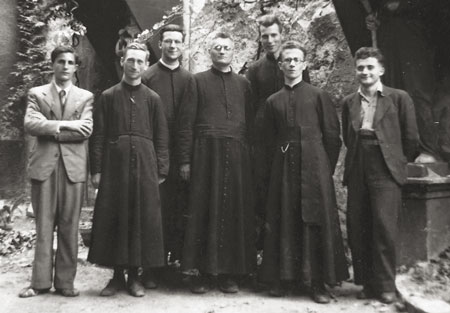
So much love for the Church and France had led Georges de Nantes to dream of becoming a monk-missionary in the steps of Father de Foucauld. This vocation, which did not cease to make itself heard, compelled him, in the summer of 1945, to offer his services to the most abandoned children of Lyon in a work project at the Prado, in the Guillotière neighbourhood, such as it had been founded by Fr. Chevrier prior to Fr. Ancel’s ‘ new Prado. ’
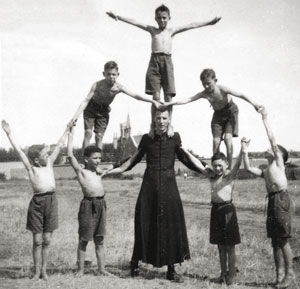
“ For three months, from dawn to dusk, the perpetual motion machine did not stop turning. Getting up, praying, having a wash, first catechism lesson (a moment of respite for me) ; going down to the chapel [where he heard the children hailing the Blessed Sacrament in an unforgettable way : ‘ May Our Lord Jesus Christ be forever praised, adored, loved and thanked in the Most Blessed Sacrament of the altar ! ’], attending Mass with vernacular hymns, breakfast… Twice a week there was the dreaded trial : a walk through Lyon or on the wharves of the Rhône ; we had to keep our eyes on the thieves, who would nevertheless come back with their pockets full of fruits, knives, cigarette lighters and postal cards. How did they get away with it ? There was, however, never a complaint : ‘ Ah, it’s the kids of the Prado ! The poor priests, they have a lot of trouble ! ’ Then recapture a runaway in order not to have him fetched by the police !
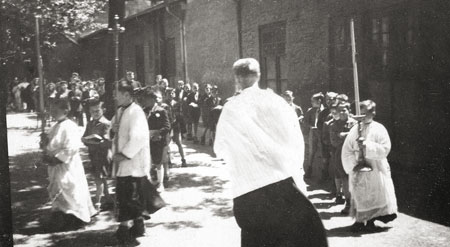
“ Then my humiliation was very pleasant to the soul when, with my bare feet in my big shoes, the cassock bleached with sweat, without a white collar, like a terror-stricken warder, I bumped into a cousin who seemed not to see me or, all the same, said hello as one would to a friend seen in handcuffs between two policemen : ‘ Ah, you’re at the Prado ! ’ I, however, was happy, absolutely happy. The Gospel was finally being lived out before my eyes by Fr. Virion, by the old Fr. Chervier, by other Fathers less edifying but very deserving, and by my helpers, devoted supervisors long since on the go and tired out, or there temporarily and too quickly gone. The Gospel lived out at La Guillotière ! ”
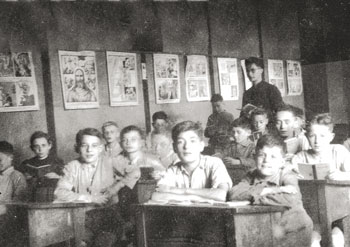
" May Our Lord Jesus Christ be forever praised, adored, loved and thanked in the Most Blessed Sacrament of the altar ! "
It was endearing, but exhausting !
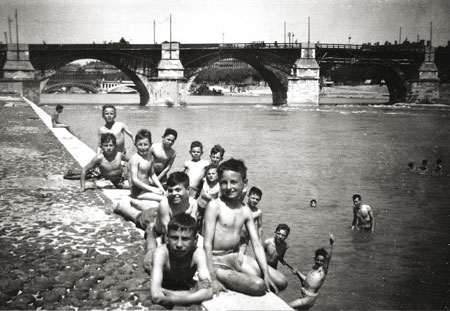
" The musty smell of the chapel made me feel the poverty of the place. I was moved by the impoverishment of these unfortunate children. "
“ As I was growing thinner at this rate, Fr. Virion became alarmed and obliged me to go at 10 o’clock, during his third catechism class, to receive a large glass of sugared wine from the sisters in the kitchen, through the hatch that communicated with the refectory of the priests. It remains engraved in my memory because on August 15, when giving me my ‘ tonic ’ and the three customary little cookies, the superior very sadly said to me :
“ ‘ It is a very sad Assumption, this year ! ’
“ I made a slight gesture of agreement without understanding, and already the shutter had been closed. On the table where I sat down, however, a newspaper was lying. It had an enormous last-minute headline :
“ PÉTAIN CONDEMNED TO DEATH. ”
“ I wept; I felt alone, lost in an evil world. This bare and empty refectory, this silent crucifix hanging on the wall, this newspaper, my ridiculous glass of wine and I. It was like a prison. I did not dare knock on the shutter of the kitchen. I could not bother anyone. Unless Fr. Ancel was there ? I went upstairs ; he was not there. How fortunate I was ! When I saw him again and dared to say to him :
“ ‘ Did you see it, Father, they condemned the Marshal ! ’
“ He replied to me in his expeditious, energetic and gentle voice :
“ ‘ He has deserved this condemnation because he lied to the people; heads of state have no right to lie to the people. ’
“ ‘ Whenever did he do that, Father ? ’
“ ‘ With the collaboration… ’
“ I replied nothing. I needed help from On High, however, in order to get back into the perpetual motion machine where I had left it for an instant. The bell rang, lines were formed, we went up to the third floor ; we put on our town clothes, descended in silence, prayed in the chapel – a marvellous moment – then we left for the walk. My shame and my sorrow were like a dead weight. ” 15
Thus, everything can be explained by this rallying and this denial : “ If the momentum, if the expansion of the Prado, like other, undoubtedly numerous, apostolic works of the Church of France, date from the time of trial that we must call the time of Vichy, or the years of the National Revolution, ” it is clear that the follies of the Liberation, of its purges, of its disorders and already of its revolutions, reoriented this very promising apostolate, cutting it off from its traditional sources and changing it for the worse, at the risk of ruining it, as we can see today.
“ Yet when I left the work project, tearing myself away from these ‘ kids of Lyon ’ with whom I tried to correspond for a while, I was firmly decided on entering the Prado. Fr. Ancel appointed me the person in charge of the group of seminarians destined for the Prado at Issy, where I was returning to start my theological studies. ” 16
In fact, Georges de Nantes was ready to commit himself to the Prado because that is where he found “ the Gospel, ” as he had glimpsed it through Father de Foucauld. The following episodes are going to reveal to us that yes, he has been set ‘ aside ’ for the Gospel, but in a different manner.
(1) Memoirs and Anecdotes, Vol. II, p. 93.
(2) Memoirs and Anecdotes, Vol. II, pp. 96-97.
(3) Ibid., p. 97.
(4) Ibid., pp. 98-99.
(5) This is an official falsehood created by the Communist party and their Christian Democrat allies to justify the summary executions of those who had remained faithful to France’s legitimate head of state, Marshal Pétain. In his Letter no. 114, our Father wrote, concerning this period: “ In 1944 we entered into a false world, where not only the ideologies of the parties were misleading, but also, but above all, the analyses of events and the descriptions of facts were untrue. Theoretical morality was not altered but its application cleverly came at the wrong moment, through the magic of ‘ disinformation ’ : ‘ Pétain, the traitor, ’ ‘ the seventy thousand members of the Party shot to death, ’ ‘ the emancipation of the working class… ’ ”
(6) Ibid., pp. 99-101.
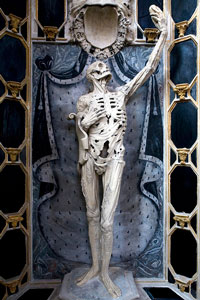 (7) A depiction of a rotting cadaver in art (as opposed to a skeleton) is called a transi. The “ Transi ” of Bar-le-Duc (beside), France, displayed in Saint-Étienne church, represents René de Chalon, Prince of Orange. The prince died in battle at age 25 during the siege of Saint-Dizier in 1544. His widow commissioned Ligier Richier, a pupil of Michelangelo, to portray Prince René “ not as a standard figure but as a life-size cadaver with strips of dried skin flapping over a hollow carcass, whose right hand clutches at the empty rib cage while the left hand holds high the actual dried heart of the prince in a grand gesture ” This white stone sculpture is set against a backdrop representing his earthly riches. This Renaissance representation in which the process of death and decomposition were shown, clearly was a reminder of the vanity of earthy riches. The transi was meant to inspire feelings of penitence and a desire to get right with God. Alas, the sculpture no longer contains Chalon’s heart; it is rumoured to have gone missing sometime around the French Revolution.
(7) A depiction of a rotting cadaver in art (as opposed to a skeleton) is called a transi. The “ Transi ” of Bar-le-Duc (beside), France, displayed in Saint-Étienne church, represents René de Chalon, Prince of Orange. The prince died in battle at age 25 during the siege of Saint-Dizier in 1544. His widow commissioned Ligier Richier, a pupil of Michelangelo, to portray Prince René “ not as a standard figure but as a life-size cadaver with strips of dried skin flapping over a hollow carcass, whose right hand clutches at the empty rib cage while the left hand holds high the actual dried heart of the prince in a grand gesture ” This white stone sculpture is set against a backdrop representing his earthly riches. This Renaissance representation in which the process of death and decomposition were shown, clearly was a reminder of the vanity of earthy riches. The transi was meant to inspire feelings of penitence and a desire to get right with God. Alas, the sculpture no longer contains Chalon’s heart; it is rumoured to have gone missing sometime around the French Revolution.
(8) Ibid., pp. 106-108.
(9) Ibid., pp. 108-109.
(10) Ibid., pp. 109-110.
(11) Ibid., pp. 110-111.
(12) The Catho [Institut catholique de Paris: the Catholic University of Paris, is a private university located in Paris composed of academic faculties, institutes and schools of management.]
(13) Ibid., pp. 112-118. Fr. de Nantes clarified this matter thirty-five years later in his study : “ Evolution and Creation. To Finish with Darwin, ” CCR no. 143, February 1982.
(14) Memoirs and Anecdotes, Vol. II, pp. 119-121.
(15) Ibid., pp. 128-130.
(16) Ibid., pp. 141-142.